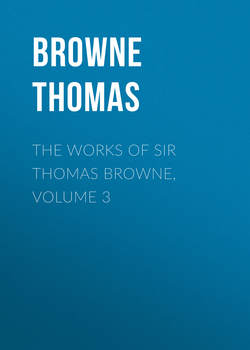Читать книгу The Works of Sir Thomas Browne, Volume 3 - Browne Thomas - Страница 23
HYDRIOTAPHIA
URNE-BURIALL
OR A DISCOURSE OF THE SEPULCHRALL URNES LATELY FOUND IN NORFOLK
TO MY WORTHY AND HONOURED FRIEND THOMAS LE GROS
Of Crostwick Esquire
ОглавлениеWhen the Funerall pyre was out, and the last valediction over, men took a lasting adieu of their interred Friends, little expecting the curiosity of future ages should comment upon their ashes, and having no old experience of the duration of their Reliques, held no opinion of such after-considerations.
But who knows the fate of his bones, or how often he is to be buried? who hath the Oracle of his ashes, or whether they are to be scattered? The Reliques of many lie like the ruines of [A]Pompeys, in all parts of the earth; And when they arrive at your hands, these may seem to have wandred farre, who in a [B] direct and Meridian Travell, have but few miles of known Earth between your selfe and the Pole.
That the bones of Theseus should be seen again [C]in Athens, was not beyond conjecture, and hopeful expectation; but that these should arise so opportunely to serve your self, was an hit of fate and honour beyond prediction.
We cannot but wish these Urnes might have the effect of Theatrical vessels, and great [D]Hippodrome Urnes in Rome; to resound the acclamations and honour due unto you. But these are sad and sepulchral Pitchers, which have no joyfull voices; silently expressing old mortality, the ruines of forgotten times, and can only speak with life, how long in this corruptible frame, some parts may be uncorrupted; yet able to out-last bones long unborn, and noblest [E]pyle among us.
We present not these as any strange sight or spectacle unknown to your eyes, who have beheld the best of Urnes, and noblest variety of Ashes; Who are your self no slender master of Antiquities, and can daily command the view of so many Imperiall faces; Which raiseth your thoughts unto old things, and consideration of times before you, when even living men were Antiquities; when the living might exceed the dead, and to depart this world, could not be properly said, to go unto the [F]greater number. And so run up your thoughts upon the ancient of dayes, the Antiquaries truest object, unto whom the eldest parcels are young, and earth it self an Infant; and without [G]Ægyptian account makes but small noise in thousands.
We were hinted by the occasion, not catched the opportunity to write of old things, or intrude upon the Antiquary. We are coldly drawn unto discourses of Antiquities, who have scarce time before us to comprehend new things, or make out learned Novelties. But seeing they arose as they lay, almost in silence among us, at least in short account suddenly passed over; we were very unwilling they should die again, and be buried twice among us.
Beside, to preserve the living, and make the dead to live, to keep men out of their Urnes, and discourse of humane fragments in them, is not impertinent unto our profession; whose study is life and death, who daily behold examples of mortality, and of all men least need artificial memento’s, or coffins by our bed side, to minde us of our graves.
’Tis time to observe Occurrences, and let nothing remarkable escape us; The Supinity of elder dayes hath left so much in silence, or time hath so martyred the Records, that the most industrious[H] heads do finde no easie work to erect a new Britannia.
’Tis opportune to look back upon old times, and contemplate our Forefathers. Great examples grow thin, and to be fetched from the passed world. Simplicity flies away, and iniquity comes at long strides upon us. We have enough to do to make up our selves from present and passed times, and the whole stage of things scarce serveth for our instruction. A compleat peece of vertue must be made up from the Centos of all ages, as all the beauties of Greece could make but one handsome Venus.
When the bones of King Arthur were digged up[I], the old Race might think, they beheld therein some Originals of themselves; Unto these of our Urnes none here can pretend relation, and can only behold the Reliques of those persons, who in their life giving the Laws unto their predecessors, after long obscurity, now lye at their mercies. But remembring the early civility they brought upon these Countreys, and forgetting long passed mischiefs; We mercifully preserve their bones, and pisse not upon their ashes.
In the offer of these Antiquities we drive not at ancient Families, so long out-lasted by them; We are farre from erecting your worth upon the pillars of your Fore-fathers, whose merits you illustrate. We honour your old Virtues, conformable unto times before you, which are the Noblest Armoury. And having long experience of your friendly conversation, void of empty Formality, full of freedome, constant and Generous Honesty, I look upon you as a Gemme of the Old Rock[J], and must professe my self even to Urne and Ashes,
Your ever faithfull Friend,
and Servant
THOMAS BROWNE.
Norwich, May 1.
